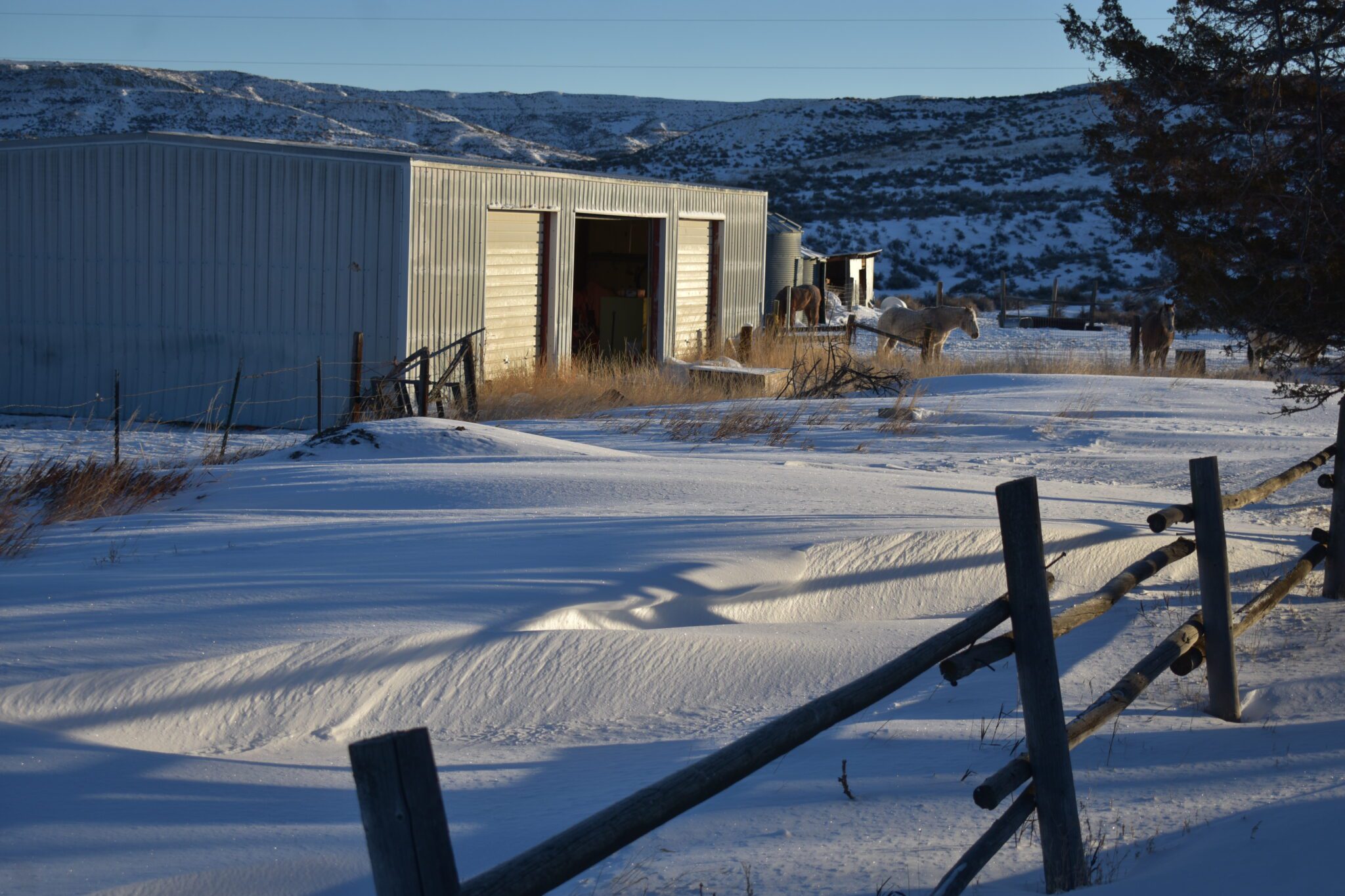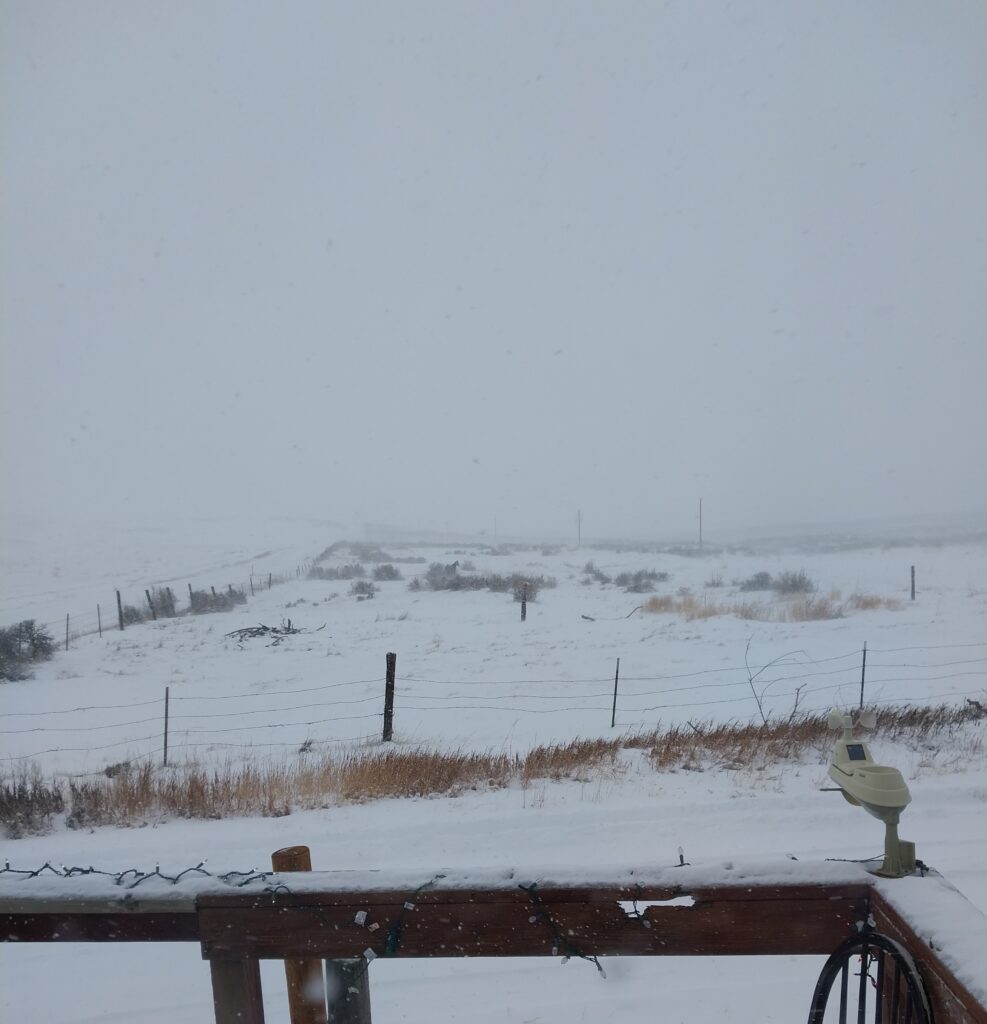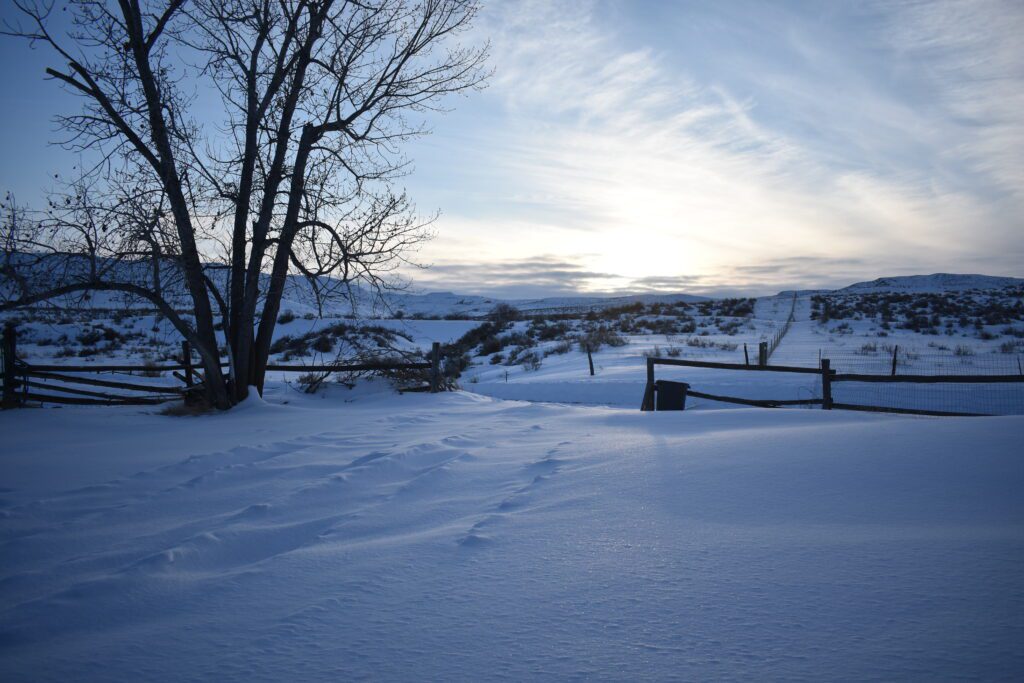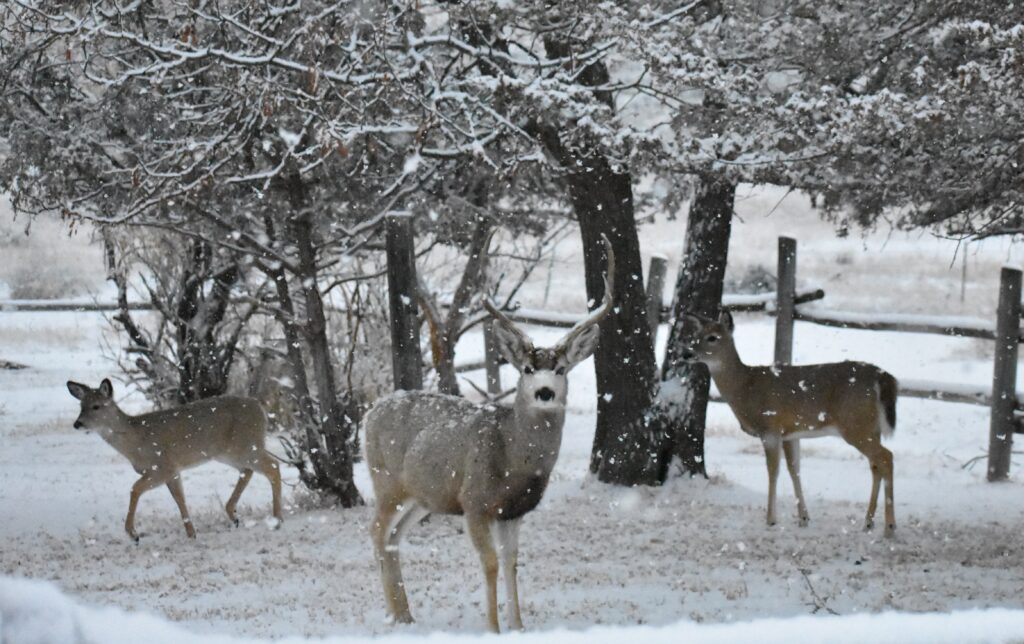News
History: Some Historic Blizzards

Snow Drifts Left after the Jan. 22 Blizzard.
Recently, on Jan. 22, as blizzard blew through the Sheridan area, causing road closures, travel warnings and two-hour school delays the next morning. Blizzards are a fact of life living in Wyoming, just like earthquakes are in California and Hurricane season on the east coast. Wyomingites learn to live with them.
This week’s history column will look back at some early-day blizzard in the region. Today, we have many early warning systems in place so people can be prepared. However, in the early days, there was often no way of knowing just when a blizzard would strike.

This from the Sheridan Daily Enterprise, December 3, 1909
Blizzard Seizes City and Northern Wyoming Semi-Panic Follows Among Children At Local Performance and Police Are Called
Three Trains Are Stalled Wyoming Blizzard In Brief. Two stock trains stalled near Frannie with engines trying vainly to reach them.
Children at Kirby opera house in near panic when blizzard strikes city and police are called. All trains of Burlington are moving as couble headers. Reception to Fort Mackenzie offices and ladies postponed. Sheridan county stock suffer heavily and many are expected to perish. Coal trains stalled near Basin on Burlington and drifts are six feet high between Basin and Lovell.
A blizzard which pioneers pronouce the most severe since 1896 struck Sherian county late yesterday afternoon with a wind what at times reached a velocity of 38 miles an hour. Business was practically abandoned shotrly after 6 o’clock and the strees of the city were deserted.
The chief features of the storm in Sheridan were the semi-panic whiche seized hundreds of children at the Kirby opera house, necessitating the assistance of the local police to quiet them and escort them to their homes, and the postponement of the reception and dance scheduled at the Sheridan Inn to the officers and ladies of Fort Mackenzie. This affair will be held Monday evening instead.
Experienced stockmen said last night that there would be heavy loss without doubt on the grazing lands. The sheep are expected to suffer particularly because of the sudden change from the comparatively mild weather to the seven cold.
The high wind in the city soon drifted the snow into huge piles and residents who attempted earlier in the afternoon to clear their walks soon ceased their efforts and remained close to their fireside.
In the business section last night there were great drifts some three and four feet high and on Broadway one drift reached a height of five feet. In the residence district conditions were even worse and the few pedestrians who were forced, to venture forth made their way with difficulty. On Residence Hill there were many drifts three and four feet high.

Trains on the Burlington last night were kept on time by the use of powerful consolidated engines. No. 44. due here at 12:35 a.m., did not await the Northern Pacific connection at Billings, but started from there on time with two engines and a light train. Snow impeded the progress as it neared the city, and more trouble was expected when it departed eastward.
The last reading of the local weather bureau at 6 o’clock last night showed 14 degrees above zero, with the mercury sinking rapidly, colder weather is predicted for today.
Danger to Children. But for the efforts of the members of the Sheridan police force it is probable many small children would have perished or have been badly frozen in the blizzard The Buster Brown show in the afternoon attracted hundreds of little ones, and when the show ended the blizzard was at its worst. Many parents went to the Klrby to take their children home and many others telephoned to the police asking them to look after their little ones. However, there were scores of children at the show with no one to look after them, and had they started out through the storm must inevitably have perished, Realizing the danger, Chief Thomas with several officers went to the opera house and when the show closed forbid any of the children who were unattended to leave.
So engrossed were the little folks with Busier Brown and Tige that they did not know a storm was raging. When the show ended, and they went to the doors and looked out, they were terribly frightened. Scores began crying, others were running to and fro hunting their little brothers and sisters who had come with them, and it was only through the efforts of the officers that a panic was avoided which many might have been severely injured.
After a time, the officers succeeded in calming the tumult, and the fears of the children subsided. Those who lived near were either taken or sent home with adults who were going past their homes, and those living at a distance were sent in carriages. It was long after dark before the last load was sent on its way, but all reached their homes in safety.
Today, with cell phones that can connect us almost instantly, we forget how different the first telephone exchanges were. This from the above story.
Exchange Feels Brunt. Never since the first telephone was installed in Sheridan, (1897) had so many messages passed through the central exchange in the same length of time as were handled by the telephone girls between the Hours of 5 and 6 last evening. Hundreds of children were at the Kirby to see “Buster Brown” and his dog “Tige” and when the blizzard came on mothers were almost frantic with anxiety, fearing; they would perish on their way home, and all were using the telephone in an attempt, to locate their children.
Businessmen who wished to go to their homes were calling cabs. Many were ordering carriages to take them to the reception, and messages of various other kinds were being sent. At the central telephone station, the switch board is of the kind designated as a “five position board.” It is intended to accommodate five operators, but as a matter of fact, nine girls were working and even then, they could not keep pace with the calls. Six girls worked at the board and behind them stood three more who watched and as soon as the signal indicated that, the subscriber had finished talking, they pulled out the plug and disconnected the phone. With this extra force, frequently there would be ten to twenty calls waiting. The girls are all experts and worked with almost incredible swiftness, and the number of calls that were answered within an hour would be practically incomputable.
You had to give those telephone operators credit.
The article continues. Another Blizzard Recalled. The blizzard of last evening calls back to the memory of the older citizens another blizzard which occurred in 1894, when Howard West, assessor of Johnson County, was so badly frozen that it was thought necessary to amputate both his feet, while the terrible ordeal through which he passed so ruined his health that he died only a few years later. West started out from his home in Buffalo with a team and buggy. The sun was shining and there was nothing to give intimation of the storm that was soon to sweep over the country. He was well on his road to Lake DeSmet when the storm struck him. Soon it became so severe that he determined to start for home. He had not gone far when he became bewildered and lost all sense of direction. The snow bad drifted so badly that his team could not get through, and in order to give the horses a chance to save themselves, if they could, he cut them loose from the buggy. It afterward developed that at that time he was only a short distance from Barkey’s ranch, where he would have found warmth and shelter. The horses, with that instinct to which many men bewildered and lost owe their lives, went almost directly to the ranch, and had West followed, would soon have received succor.
By that time, however, West was so cold that he was dazed and remembered little of his experience. The next morning, he was found by some soldiers near Buffalo, still able to wander around, but with his mind a blank.
Two Stock Trains Stalled. ( Special to The Enterprise.) Cody, Wyo. Dec. 2 – Two stock trains on the Burlington were stalled in huge snowdrifts which blocked the tracks near Frannie, according to a message received from that place to-night. At midnight the trains were still blocked, with two engines trying to reach them. It is feared that some of the stock will perish in the intense cold before the trains were extricated.
Coal Train is Blocked. (Special to The Enterprise.) Basin. Wyo., Dec. 2. — A coal train on the Burlington was stalled tonight not far from here after the engine coal and water had been exhausted in fighting . Drifts between here andLovell are six feet in places. The blizzard is the most intense in years and great loss of stock is expected to follow.

Wildlife can also suffer during blizzards, and trying to find food buried under snow drifts.
Another bad blizzard that swept through Wyoming was during the winter of 1887-1888. It was also known as the Children’s Blizzard.
This from the Torrington Telegram, February 9, 1922 – Recalls Blizzard Of 1888 – The recent visit of Mrs. E. B. Penny, of Fullerton, state president of the Nebraska Women’s Clubs, to the various women’s clubs of Scottsbluff, Gering, Mitchell and Morrill, brought to mind the harrowing experiences of many teachers and pupils in the terrible blizzard of January 12, 1888. The day had been one of unusual calm. Several inches of the lightest snow had fallen without a breath of air stirring to move it. When suddenly in mid-afternoon without a moment’s warning a terrific gale swept down the valley, whirling and lashing the feathery snow in its fury.
G. B. Mark, now editor of the Mitchell Index, was at that time a country schoolteacher. Like many others, he and his charges were reached by a rescue party, but not until after dark and were then lost for a time before reaching their destination. Cases are recorded where teachers and pupils lost their lives in the storm while others were maimed for life from effects of cold and exposure.
Some remained in the schoolhouse until the storm had spent its strength, but Mrs. Penny, then Miss Minnie Freeman, was forced to brave the elements as the roof of her schoolhouse was carried away by the storm and by tying her little band of a dozen children together by means of jumping ropes, she conducted them to safety.
While blizzards are common during Wyoming winters, and even springs, today, new weather technology can at least give one an idea of what it on the horizon. Winter is only half over so far this year, 2025, so be safe out there and remember, in the winter it is better to arrive late and alive then to travel on the roads in bad weather.

